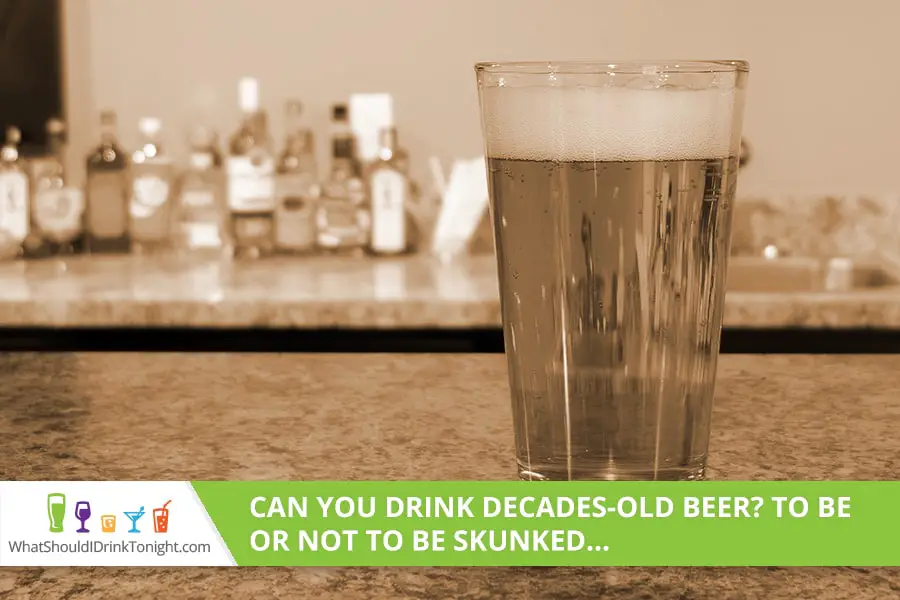Can I drink this old beer? It’s got to be at least a couple decades old…This was what I was muttering to myself last weekend when I came across a few cool looking dusty cans in my uncle’s garage. It was cold in there so the cans were definitely cold and I was also pretty thirsty after working for a few hours. In the end I chickened out but then I went online and found out a few things about decades old beer.
So, can you drink decades old beer? Yes, it is a resounding yes as far as health is concerned. Beer will preserve quite well for long periods of time due to its alcohol content and type of packaging. However, after about 6 months, the flavor of the beverage will change or become “skunked.”
Chances are the beer I found in my uncle’s garage wouldn’t have tasted too great but it wouldn’t have killed me either. In my aforementioned research I found some interesting things about what happens to beer as it ages and why those things happen, as well as a few cool tidbits on the history of beer. So read on to find out about what to do when you have the age old debate about what to do with that beautiful old can of beer you found.
How Beer Came To Be
The origin story of beer is still somewhat of an enigma. The most likely creation story of this beverage that is older than written history has been tracked down to ancient Mesopotamia. Supposedly, beer was an accidental creation, as most of our best creations are, when a jar of collected barley grain was left out in a field during a rain.
As it turned out, not only was this mystery liquid palatable, but it had an intoxicating effect. These early humans must have felt as if the spirits had blessed them by giving them this magical brew seemingly overnight, and probably cursed them the next morning because of the world’s first hanovers!
While they may have believed their jar had been possessed by joyous spirits looking to share and spread joy to man, today we know that what happened is called spontaneous fermentation. Yeast is a fungus, and fungi reproduce by way of spontaneously creating microscopic spores that use the air itself as its transportation vector.
So, while the rain-soaked barley grains were beginning to sprout in the jar, turning starches into sugars for the use of growth, the yeast found this environment a suitable habitat to establish growth. In this soupy sugar rich environment, the yeast would explode in numbers and begin an anaerobic fermentation that results in ethanal creation. About 70% of the flavor of beer comes from this fermentation process!
What Happens to Old Beer as It Ages?
So now that we know how beer is created, let’s find out about what happens as it ages.
Beer is a product that is often pasteurized before being packaged, and some of the ingredients such as hops, and alcohol will have a preservative effect. Beer will keep for a long time compared to other food and drink. However, over time the beer’s flavor will alter, either giving the beer an altogether different flavor, or simply causing it to taste bad.
As it turns out, canned or bottled beer has a pretty long shelf life, especially if kept refrigerated. However, over the course of 6 to 9 months, the beer’s flavor will begin to alter and seemingly taste flat. Those who are familiar with the artisanal crafting of home brewed beer will most likely be familiar with the flavors and aromas that accompany an “off” beer.
As time progresses, regardless of whether the beer is bottled or in a can, the beverage will oxidize. This is because the beer itself contains oxygen and will eventually begin to interact with different chemicals in the beer. This will produce off flavors and smells in the beer that may ward off any potential drinkers.
Oxidation can cause a variety of smells and appearances to happen in beer such as:
- A smell and odor like cardboard or paper.
- Other odors can have a hospital like smell or banana odors.
- It can create a hazy appearance.
Oxidized beer is still safe to drink even if it doesn’t taste fresh however, there are other things that can happen to beer that can cause it to become undrinkable. Most of these things will not make you sick, but they may upset your stomach for a little while, but nothing more serious than a hangover by any means.
It is not unheard of for people to drink beer that has been aged for tens of decades. In fact, depending on the quality of the brewing process, aged beer can make beer more delicious and sought after than freshly made beer. In the worst case scenario, it will taste a bit off or become vinegar.
Old Beer Turns into Vinegar?!?
Ever found a beer in a hidden corner of the house and took a swig to taste vinegar? Good, I’m glad I’m not the only one here. Don’t throw that out. It won’t make you sick. What you have inadvertently created is malt vinegar, which is a premium cooking ingredient for many sauce and dressing recipes.
In some cultures, people would leave open containers of beer out that they didn’t finish or had gone flat and let flies land into it. Kind of like how grandma hangs bags of water over the door, but this wives-tale had a neat side effect. See this kind of bacteria, known as acetobacter, often lives on the carapace of flies and acetobacter is the agent responsible for the creation of vinegar.
This is how it works: The yeast loves sugar, and it turns all manners of sugars into ethanol alcohol. Acetobacter loves ethanal alcohol and will turn ethanol into vinegar. It’s a pretty simple process but because of the flies it definitely seems a bit gross.
Since the industrial process of creating vinegar usually creates an inferior product, feel free to keep a jar of beer turned vinegar around as a “vinegar mother”. Traditionally Italian families would pour their left-over wine at the end of the night into a cask with a vinegar mother in it to use the next day for cooking.
It seems humans just can’t lose when it comes to beer, we can either drink it or let it turn into something else useful!
Other Old Beer Tastes
Aside from acetobacter pulling a beer to vinegar act, there is another microscopic scoundrel out there that may ruin your beer. By ruin, I mean create an altogether different and unexpected flavor profile some may enjoy. This culprit is known as lactobacillus, the bacteria known for creating yogurt and other fermented milk products.
When introduced after the boiling process of creating beer, it can produce a wonderful sour profile to your beer. Due to the prolific reproduction rates of bacteria, though, you will most likely only be able to use that equipment for the creation of sour beer. If lactobacillus happens to get into your beer after it has been open, it creates an extra sour taste.
In conclusion, while they won’t make you sick, we have identified a few things that can create weird flavors in old beer:
- Acetobacter, which is responsible for turning your old beer into vinegar.
- Lactobacillus, which will make a beer sour
- Oxygen, which can cause spoilage in the beer even in small amounts, possibly leading to unpleasant flavors and a hazy appearance.
So, while old beer may not have the expected taste, it is perfectly safe to drink. If it’s ever you and I with an old can in our hands, I’ll let you pop your top first and tell me all about the taste!

